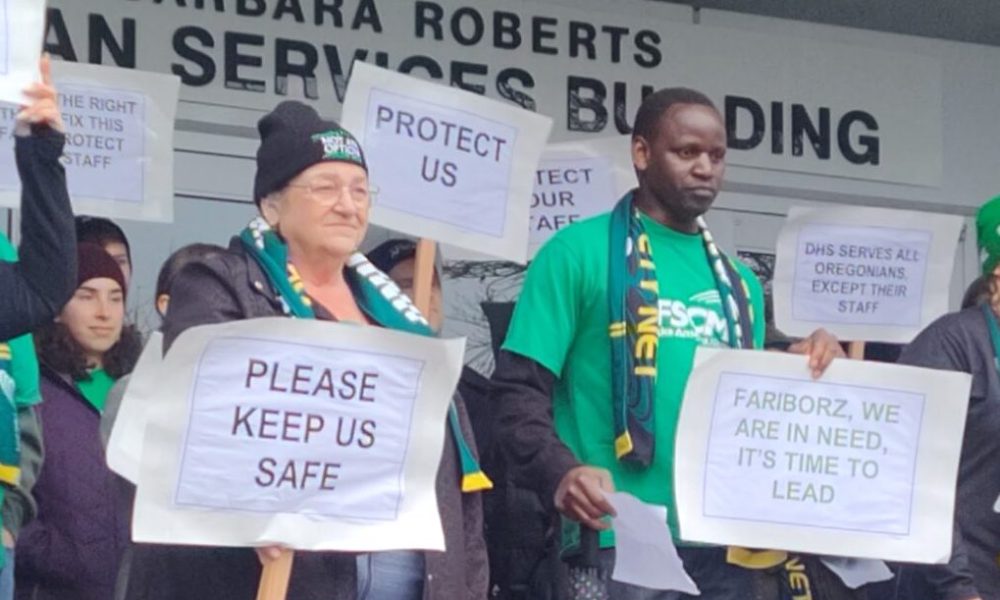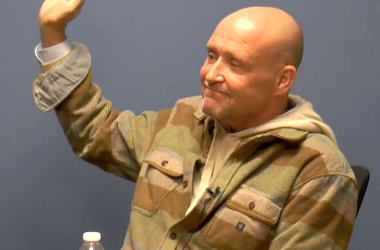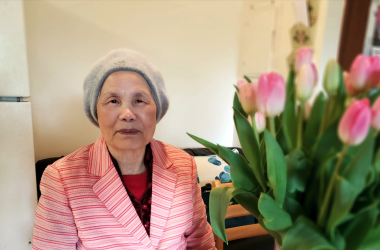Ronda Martinez, a caregiver at the Oregon Department of Human Services, has endured injury after injury in her 27 years tending for some of the state’s most vulnerable residents in group homes.
At times, her 19-year-old son, Devon Howell, has needed to explain to his friends why his mother had a black eye: an assault at her job.
“Most children don’t see those things with their parents,” said Martinez, 45, a caregiver in a Keizer group home. “For him, it’s just another day.”
Martinez was among the nearly 100 Oregon Department of Human Services caregivers and support employees who picketed in front of the agency’s headquarters in Salem on Thursday to protest working conditions that include mandatory double shifts, burnout and unsafe environments and call for the state to increase pay to better recruit and retain staffers.
The event was organized by the employees’ union, the American Federation of State, County and Municipal Employees union Local 1246. The union and state are bargaining for a new contract.
In all, more than 600 employees work for the Oregon Department of Human Services’ Stabilization and Crisis Unit. The 24-hour residential program serves up to 95 people in 20 group homes that stretch from Eugene to Portland. Residents have intellectual and developmental disabilities, often combined with mental health issues that require close supervision and sometimes more than one-on-one care during a crisis.
The low-paying, high-stress jobs can take their toll. Starting wages are around $20 per hour on the low end.
Employees say it’s not enough to recruit and retain staff. From November 2021 to April 2022, employees received pandemic pay: an extra $6 an hour during the week and $14 an hour during the weekend. With the extra pay gone, workers say staff shortages are pushing them to the brink.
“We’re sick and tired of being sick and tired,” Christina Sydenstricker-Brown, a caregiver and president of the union for her agency’s unit, said as she addressed the group and led employees in a march. They marched through the agency’s lobby and around the adjoining sidewalks, with signs that said: “Protect your staff” and “DHS, you make us work in a mess, step up and do what’s best.”
Saihou Suwaneh, a caregiver in Portland for 21 years, said the hours – including multiple double shifts – are tough on his family.
“You are exhausted,” Suwaneh, 54, said in an interview. “You don’t see your family. You don’t see your kids.”
Previously, an agency spokesperson has said the department has increased its efforts to recruit staff and taken steps that include hiring temporary contracted staffers, increasing its presence at job fairs and it plans a hiring event in May with same-day job offers. A job posting for caregivers in the unit – called direct support crisis specialists – advertises a monthly pay range of $3,264 to $4,911 for full-time employees. The hourly range: $19.24 to $27.48 for part-time employees.
The agency also says it takes safety – and adequate staffing requirements – seriously.
But for employees in the field, conditions remain harsh. The staffing is problematic because a group home may need seven employees for a shift, but only have five if it’s shorthanded. That leaves fewer staff available to jump in if a resident has a crisis.
specialists – advertises a monthly pay range of $3,264 to $4,911 for full-time employees. The hourly range: $19.24 to $27.48 for part-time employees.
The agency also says it takes safety – and adequate staffing requirements – seriously.
But for employees in the field, conditions remain harsh. The staffing is problematic because a group home may need seven employees for a shift, but only have five if it’s shorthanded. That leaves fewer staff available to jump in if a resident has a crisis.
Amy Chambers, 47, is a caregiver in a Salem group home with 25 years of experience. She said she suffers from post-traumatic stress disorder when she has to work on one side of the house where she’s been injured.
“I have been injured more on that side of the house and so I kind of get gun shy, but I’ve still got to go in and respond and they don’t care about that,” she said.
Injuries can run the gamut.
“I’ve been bit, scratched, punched,” Chambers said.
That’s true for other workers too.
“I’ve had my nose broken,” Martinez said. “I’ve had a black eye. I’ve been stabbed with pretty much everything pencil, crayon, Sharpies, forks, you name it. I’ve had my hair pulled.”
Residents enter the homes through a referral process. They can come from a variety of settings.
“Recently, the majority of our individuals we get, the police are dropping off at our doors,” Martinez said. “We’re getting them from the (Oregon) State Hospital.”
Martinez said the residents who arrive are often highly intelligent, well-dressed and have lived independently before.
“They’re highly combative,” Martinez said. “They’re smart. They’re very smart.”
Martinez said residents can pick up on when their environment is shorthanded.
“They plan. They’ll look and see: Ok, who all’s on duty? And they’ll headcount,” Martinez said. “They’ll be like, ‘Oh, there’s only five. All right, so if I’m gonna do anything to try to manipulate my environment or my situation, now’s the time to do it.’”

Ben Botkin - Oregon Capital Chronicle
Ben Botkin covers justice, health and social services issues for the Oregon Capital Chronicle. He has been a reporter since 2003, when he drove from his Midwest locale to Idaho for his first journalism job. He has written extensively about politics and state agencies in Idaho, Nevada and Oregon. Most recently, he covered health care and the Oregon Legislature for The Lund Report. Botkin has won multiple journalism awards for his investigative and enterprise reporting, including on education, state budgets and criminal justice.









